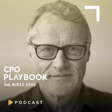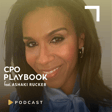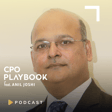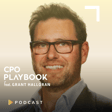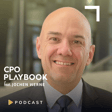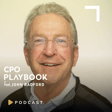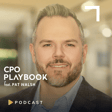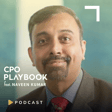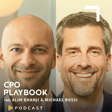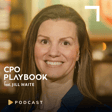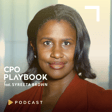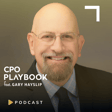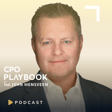Introduction to the CPO Playbook
00:00:01
Speaker
I'm Felicia Shakiba, and this is CPO Playbook, where we solve a business challenge in every episode.
Transformative Power of Performance Management
00:00:14
Speaker
McKinsey emphasizes that effective performance management can turn organizations into formidable competitive entities. For example, much of GE's successful transformation during former CEO Jack Welch's tenure was credited to his skill in aligning the company's 250,000 employees towards common goals and maximizing their individual capabilities.
00:00:37
Speaker
Today, there is still more research to be done on what makes performance management effective.
Insights from Kyle Lagunas on HR Performance
00:00:43
Speaker
Luckily, our guest today is the head of strategy and principal analyst at aptitude research, Kyle Lagunas. Kyle is here to share his latest research after he noticed there was a disconnect between how effective HR leaders perceived their performance management programs versus the actual impact they were having.
00:01:02
Speaker
Lagunas has spent over a decade studying innovation cycles in HR and talent technology. He's a transformational talent leader, top industry analyst, and no-nonsense strategist with a reputation for bringing a fresh perspective to the table. Kyle, welcome to the show. Oh my gosh, I'm so excited to be here. I'm so excited to have you. It's been a while. It's been too long.
00:01:28
Speaker
Kyle, what prompted your investigation into the effectiveness of performance management?
00:01:33
Speaker
I wish it was like a really happy moment of inspiration, but instead it was looking at one of the hardest things that HR has to deal with and wondering if they were prepared. In 2023, we know that this crazy, like all cylinders are firing on all cylinders hiring came to an abrupt halt.
00:01:58
Speaker
And not just that we actually did a complete about face in many areas we had over hired. And so layoffs were and still are happening. And I was talking to our friend Laurie Ruderman.
Challenges in Performance and Layoffs
00:02:11
Speaker
My question was, does HR actually have the data that it needs to inform and advise decisions beyond just like layoffs isn't just a cost cutting exercise or it can't be limited to that because you and I know
00:02:28
Speaker
there are downstream effects, like impact on, of course, employee morale, but also performance and engagement. And I just didn't know if HR could do anything else besides just go into that compliance mode, make sure that we were letting people go in a respectful and safe way and then giving them an appropriate severance. I think that's just where everybody went. And I was wondering, are we actually in the room saying, hey, like,
00:02:56
Speaker
this is what performance really looks like and here's what like that impact will have. So I felt like it was a knowledge gap and I wanted to go and test it.
Surveying Impact of Performance Management
00:03:05
Speaker
That makes sense to me. I've done a number of programs where we're looking to reduce headcount, and I've had to really coach leaders on how to make those decisions fair and equitable. I think it's a really tough challenge for a lot of leaders to do. How did you measure the impact that programs were having in different areas like retention, engagement, et cetera?
00:03:30
Speaker
Our primary tool was a survey and we surveyed about, oh, I think 216 HR leaders in North America, by the way, and that's just the limitation of my survey tool. But we asked them to self-report and we asked them to report their overall effectiveness. We asked them to share their practices, reporting cadences, how data is captured, et cetera.
00:03:53
Speaker
What I did was I segmented out those companies who rated themselves at the highest level of performance effectiveness, like those who noted that they were very effective in performance management. And I compared those responses against those who were not very effective, basically all others.
00:04:12
Speaker
And that was where the proof started to come out. The big scary thing when I first looked at the survey data was that 80% of the HR leaders that we surveyed said that they were effective or better. And I was like, well, I don't think that's right. I'm like, did I get really bad survey sample data? But then so I segmented it out and I was like, oh,
Building Trust Through Effective Performance
00:04:33
Speaker
here we go. The people who did rate themselves at the very top, which was like 30% of the survey,
00:04:39
Speaker
versus those that were in the all other group, there were some really interesting differences. And I have some stats that I'd like to share with you. Please. So for example, we asked all the survey respondents like rate your the output of or the capability of your performance management programs across these certain areas. One question was how well is your performance management program building trust with employees and confidence in your company's employee value proposition. Right. We want to know like how equitable do people feel like this is.
00:05:09
Speaker
And those that were in the very effective cohort, again, 30% of those survey respondents, 70% said that they were very effective in building employee trust.
Integrating Performance Management Across HR
00:05:21
Speaker
The all other cohort, 19% said that they were very effective in building employee trust and confidence.
00:05:29
Speaker
So it's all self-reported, but then you start to look at the differences in outcomes of these programs. You're like, okay, I actually can quantify. Yeah, those who are saying they're very effective, they really are cut above. So what did you discover from analyzing the differences between very effective versus not effective performance management programs?
00:05:52
Speaker
So a couple of things that we wanted to test and that honestly, I was going to find out how our hypotheses were right. So you and I, again, we are progressive HR leaders. We know that performance is not an isolated function, right? It is not an isolated people process. We know that the effectiveness for performance, it's going to have connection to an impact on other HR programs and initiatives.
00:06:19
Speaker
Absolutely. Things like employee development and employee career growth, employee learning and development. Succession planning. Succession planning. It's going to have an impact on employee engagement and employee retention. So a lot of different things are connected to performance. Again, our friend Lori Ruderman, who by the way was an adjunct analyst on this project, she says in HR, everything is performance. And if you don't think it is, you're wrong.
00:06:44
Speaker
I love that you brought that quote up because that is exactly what I talk to leaders all the time, that it all drills down to performance. Everything does. And it's performance is the bedrock of every other program you have in your organization. So I'm so glad you brought that quote in. Oh, OK. And like you and I are like mind. And by the way, we're right. And here's how I know that. So I asked this survey, asked this question in two ways.
00:07:14
Speaker
How important is performance management related to each of these processes and programs? Diversity, equity, inclusion, talent, retention, like each of them, rated them.
00:07:24
Speaker
then I asked them, how impactful is your performance management program in these areas? So two questions, how important is it to be integrated and how impactful is it in these areas? And across the board, again, we're seeing that the companies that are in the very effective cohort, they are saying that it is for every one of those different processes and programs, it is very important that performance has an impact on them.
00:07:50
Speaker
that it is driving outcomes in them. Whereas those in the not very effective, they were all over the place. Some would say, eh, not a big deal. Some would say, yeah, it is important. But still, by and large, the very effective group was placing a heavy emphasis on integration of performance with these other programs.
00:08:07
Speaker
Interesting. The other question was how much of an impact is performance having in these areas? And no surprise, the companies that are being intentional in prioritizing integration of performance with other programs are having more impact in those areas.
Crafting Effective Performance Solutions
00:08:23
Speaker
And in an outsized way, I mean, we're talking about 2x and 3x more impact in pay equity.
00:08:31
Speaker
and in talent retention and employee career growth. And like, that's all really important stuff, right? The difference is just like, again, when I first looked at the survey data, it said 80% felt that they were pretty effective in performance. I was like, but when you start to peel back that onion, you find out that there is no such thing as good enough in performance management.
00:08:55
Speaker
I love that. So walk me through the steps that the organizations took to create this truly effective performance management solution. How did they do that integration? This is where I was starting to question, was I structuring this study in the right way? Because if I looked at the comparing these two cohorts and asked them what changes did they make in technology, in performance, or rewards and recognition,
00:09:20
Speaker
What changes did they make to process? There really wasn't a notable difference in the work that the two had taken on in the last, at least at that level over the last year. Where we did see a major difference was in the quality of the data that they were both capturing and using.
00:09:41
Speaker
So we asked them to rate the quality of the data they had across a couple of different qualities. How trustworthy was it? How comprehensive was it? How actionable was it? And how much did they trust it? And again, it's just like in every single one of these areas, I'm starting to look at meaningful differentiation points. If you don't have good performance data,
00:10:04
Speaker
how good can your performance management program be, right? And so I was trying to look at this foundational piece that went beyond processes, specific practices to look at outcomes. For the very effective groups, their data was very comprehensive. It was very trustworthy, it was very actionable. And we're talking about all others, including this like 40% of companies that rated themselves as effective performance management programs.
00:10:29
Speaker
were not trustworthy. They didn't trust their data. They didn't feel like it was actionable. They didn't feel like it was comprehensive. It's like, well, no wonder. And so again, I really want to drive this point home because there was just such a large percentage of survey respondents that did rate their programs as effective.
00:10:47
Speaker
And if there is this big gap in the quality of your data, how effective can your performance management be?
Perception vs Reality in Performance Management
00:10:55
Speaker
Because I just don't feel like you can have an equitable performance management program. I don't think that you can have an accurate
00:11:02
Speaker
performance management program, this foundational layer was just completely missing and it wasn't an anomaly. Because again, I'm looking at the outcomes of performance management programs between these two cohorts in terms of building trust with employees and empowering managers and the foundational pieces are missing and so are these nice to have outcomes.
00:11:25
Speaker
Why do you think there is such a disconnect between how HR leaders perceive effectiveness versus the actual results? God, I love this question. Tell me how much this resonates with you. You know what? It's not perfect, but it gets the job done and it's good enough. I have many other things I need to worry about right now. Have you ever said that about any of your programs in HR?
00:11:47
Speaker
That just makes me cringe in the way that if that is the response, I'm thinking the data must be so dirty that an unreliable and not credible or valid that it doesn't even matter what you do with your solution. Because if the data is bad, then you're really just not really doing much.
00:12:08
Speaker
I also feel like out of sight, out of mind. I mean, listen, Laurie and I went really back and forth. We were trying to put the narrative together for this research. We didn't want it to be condemning HR leaders. We do know that there is extremely high levels of burnout in the HR organization. They have been dealt a really dirty hand over the last
00:12:28
Speaker
half of a decade specifically. I really think part of it, they've got so many other things to do. They have so much to deliver on. And this is just like, you know what, my boss is not breathing down my neck for better performance management programs right now. I'm just gonna save that one for another day. I feel like it's more like fatalistic than it is just completely cynical.
00:12:49
Speaker
The empathy makes complete sense. We did an episode on HR burnout and I've written actually a couple articles on that and it's absolutely true. There's been a lot of HR burnout, especially since COVID and all of the other things that go along with that.
00:13:05
Speaker
And by the way, we didn't just do the survey. We actually ended up interviewing 10 in-seat HR practitioners and a couple of HR consultants. And we did find that that was representative, that people were just thinking like the good enough mentality is not necessarily laziness. It really is just like fatalistic. Like I've got to do a bunch of other stuff.
00:13:27
Speaker
So I think that that's the big gap at the same time. Again, if we look at like how much work these organizations have been doing in performance, there is been a flurry of activity around enhancing performance management programs and like solutioning with more purpose-built technology. So I think people are doing some work. Maybe in the timeline, they are thinking we just implemented a new thing.
00:13:50
Speaker
And so maybe we're going to wait for this newly designed programs to mature. So there might be that to it. But either way, I'm not going to just say like HR is just asleep at the wheel. But I do hope that this research is putting a spotlight on the areas that maybe they could focus their attention on to make meaningful improvements.
Data Challenges in Performance Reviews
00:14:13
Speaker
And the data piece is just a really big one for me.
00:14:16
Speaker
What surprised you the most from the interviews with subject matter experts about the good enough mindset hindering improvements? Oh my God. Well, this is actually probably connected to the data piece. Almost all of the HR leaders that we surveyed, their performance management workflow, like the portal that they would use to capture feedback was all open text. So there was actually, yeah.
00:14:41
Speaker
So there was no numerical, they might assign a number at the end overall or in certain areas, but I don't know if you've ever worked somewhere that had a nine box. Normally they would do the review and then get to a room and calibrate with their peers, like where are we putting all of the people? Right. And that's, I hope I can say this on your podcast, that's fucked up.
00:15:04
Speaker
But especially because the only numeric in a nine box like environment, the only score that matters is that the square that you end up in. Right. So I think part of it would like that was just astounding to me was that like managers are leaving open text feedback for everything. And so there is no quant. And so of course you can't report on any of this. And so of course it's not comprehensive. And
00:15:28
Speaker
How could anybody download all that information if it's all qualitative? I mean, imagine 200,000 employees. What are we doing? How can an HR business partner for an entire division actually roll up reporting on any nuances that exist in employee performance for their whole business unit? And by the way, you and I know there's a ton of nuance in employee performance.
00:15:51
Speaker
That was a real wake up call for me, but also because I think that might also be something that we can solve, right? I think that is something, yeah, leave the open text, but still have for each of these questions, like actual hard quant scoring, you know, one, two, three, or four.
00:16:10
Speaker
Yeah, the qualitative data tells the story behind quantitative data, right? We could report on quant all day, but at the end of the day, it's like, what are those factors and variables making that number realistic? I mean, both is important, right? Yeah. And that makes sense. How can prioritizing the right data help address some of the issues you uncovered?
00:16:32
Speaker
So in order to prioritize, I think that you have to know who is this primary stakeholder, right?
Empowering Employees and Managers
00:16:40
Speaker
Like everyone consumes different data and they consume data differently. And so I think that the first question you have to ask if you're trying to optimize your performance management program is who am I prioritizing as my stakeholder for this?
00:16:55
Speaker
Again, looking at the two cohorts of very effective versus not very effective, the very effective organizations are prioritizing managers and employees. And the not very effective companies are prioritizing executives and senior leadership.
00:17:11
Speaker
And so there's just very different reporting that comes out of that, right? But there's also very different data. Anyway, so start with your stakeholder audience. And if you look at the manager and you look at the employee, you think, what data do I need to give them or how do I get the data that I need from them? Those are two questions, right? And then you start to build your process from that.
00:17:35
Speaker
And I think that is ubiquitous. We didn't set out with this research to say, here are the best practices at a process level. Here's what the best performance programs look like in terms of the questions that you ask. No, it really is looking at the highest level. What makes a difference? You need to know who is your primary stakeholder and in performance, especially these days, you really do need to be focused on empowering the people doing the work and not just informing the people that are managing the business.
00:18:05
Speaker
and how can organizations prioritize the right stakeholders in their programs.
00:18:11
Speaker
having hard conversations, I think that there is a bit of psych work to be done and like I owe psychology and think like, all right, we know that we are going through an immense growth period and that growth is M&A or something. So we need to make sure that we are keeping people informed to the degree that we can and that we need to make sure that we're working continuously to integrate culture and you know, like blah, blah, blah, blah. You just need to know the business essentially is where I'm saying, where are you at? What are you trying to get done?
00:18:41
Speaker
And in order to get that done, how, what role do the employees and managers play? Because I am going to say, I think that employees and managers need to be your primary, whether it's one and two or two and one, however you, or whatever. Look at what they need, but also look at what you need to get out of them. Like employee performance, it shouldn't just be about management. It should be about empowerment and enablement from an HR perspective. So,
00:19:05
Speaker
How are you going to facilitate that? And at the same time, you also do need to know what cadence of reporting do I need to establish. Performance review process might happen once a year, but performance management we have learned isn't always an ongoing thing.
00:19:24
Speaker
And so if it's always on and it's always going, how frequently is HR reporting out on these conversations, right? I have another stat for you here. If we asked, does HR track the outcomes and or takeaways of performance discussions that regularly occur between managers and employees? Pretty simple question, right?
00:19:46
Speaker
If you look at the very effective group, I would assume that HR would be all over it, but you and I know that it doesn't always happen, right? Right. 60% of those in the very effective cohort are tracking that. They said, absolutely, we are tracking that. 28% of all others say that they are absolutely tracking that.
00:20:07
Speaker
There's the reporting piece really is I think a really good bellwether for or maybe look like cornerstone for the rest of what you do with your performance management programs.
Barriers to Performance Improvement
00:20:22
Speaker
Got it. And I like that stat. I think that's really interesting. I wonder how organizations are actually tracking that because I'm sure there's a couple different ways. But I think as long as it's consistent and reliable and valid, I don't think anything else matters. What are the common barriers that prevent organizations from improving performance management?
00:20:43
Speaker
I think it's related to the previous two questions, which it's so easy to get too many cooks in the kitchen for any HR initiative, right? But especially for something like performance, you just suddenly have a lot of people with a lot of opinions and they are going all the way up and down your stakeholder food chain.
00:21:02
Speaker
And it creates a ton of noise and a lot of frustration. And I think that that is where maybe HR is like relegating itself to a good enough mentality for performance because they just don't want to turn that rock over, right? They just don't want to open up that Pandora's box. And I get it. Like it is a heavy, heavy lift.
00:21:23
Speaker
But that is why I like this concept of starting with identifying the priority of each of your stakeholders, because then that helps to get everybody aligned on. There's always be a lot of cooks in the kitchen, but if we can get aligned at that foundational level, then we can start. We have a North Star, right? And then we can get everybody
00:21:45
Speaker
If we have disagreements or if we have differences, the way that the performance is managed in accounting is different than the way it's managed in engineering. That's just facts. But if we can just all agree that the employee is the most important stakeholder or the manager is the most important stakeholder, then each of those HRBPs or each of those business executives, heads of those departments can say, all right, I'm going to work with my HRBP to build, to adapt this core program
00:22:14
Speaker
to make sure my employees are getting what they need or whatever it is. It just starts with that stakeholder alignment.
00:22:20
Speaker
And I think having a recurring feedback loop is really important. Like many times I'll suggest a steering committee quarterly or biannually or focus group or obviously get feedback through your engagement survey. And there's lots of lots of different ways to do it. But having that consistency I think is really key. It all comes down to that stakeholder though, because if I identify
00:22:45
Speaker
the needs of each of my stakeholders, and I prioritize those needs, that gives you the reporting cadence. And you might not want to start giving out employee performance scores or feedback at a quarterly level. It might create a bunch of noise for you. But you might want to update your executive dashboards every quarter. And even if you are prioritizing the employee, again, your executives are going to have different data needs. I think that's a good point.
The Role of AI in Performance Management
00:23:12
Speaker
What role can AI play in supporting performance management? It's so interesting the mental block that some people are struggling with when it comes to this utilization of AI in anywhere in HR. So in a separate study, we asked about how HR is deploying AI. And performance management was one of the functions that people were most wary of. They were not so sure.
00:23:42
Speaker
Makes sense, a lot of sensitive data, right? But there is a lot of value here. So I segmented in that survey the companies that were actually using AI in performance management and they were outperforming all others in key metrics like company performance.
00:23:59
Speaker
and employee retention, maybe a little bit of tea leaf reading. I'm like, okay, so that validates at least that the companies that are using AI and employee performance are seeing notable, I mean, we're not talking about, again, like a 10% difference, we're talking about like significant difference in performance in these strategic KPIs, right? Another question that we have in that same survey was, do you think that AI is making the employee experience more or less human?
00:24:25
Speaker
And those companies that were using AI in employee performance and those that weren't the ones that were felt that AI was actually making it more human. It was the way that they were deploying AI was eliminating some of the heavy lift. Like you can use gen AI to read all of your manager's one-on-one notes over a whole year and create a summary like that. And that's just like a huge time savings. Guess what? Then the manager can have total recall.
00:24:55
Speaker
and think about, okay, well, Felicia, like at the beginning of the year, we had trouble aligning on goals. We actually didn't land on anything until the end of the quarter. And then you and I both know that in quarter two, everything changed. That is just such a win. Kyle, I'm like really upset with myself that I didn't think of that. That's so cool that you just said that. I feel very upset with myself.
00:25:19
Speaker
Because that's so obvious. That's the obvious use case. It's so helpful. And guess what it does? It doesn't hallucinate when it's summarizing something. It's only using the data that it has. So our concerns with Gen AI hallucinations are not relevant here.
00:25:37
Speaker
But anyway, so we looked at that. And then here in this specific survey, we asked people about how important is AI as you're thinking about new enhancements to employee performance programs. And again, in this survey, we did really see that people were on the fence overall. You're not going to be surprised, but those that were in the very effective cohort were actually more bullish on using AI in performance management.
00:26:04
Speaker
I don't know why that is. I didn't really have any good feedback from any of the HR practitioners that we surveyed. But if I look and see that the impact that AI is having for those using it, I have to imagine that these very effective performance management programs that they are in that upper echelon already in general, it's maybe they are just a little bit more
00:26:27
Speaker
hip with it. Maybe they're just a little more savvy or maybe they're just a little bit more confident in their ability to try because they're already seeing results in the work that they've already done. So yeah.
Conclusion and Invitation to Engage
00:26:38
Speaker
And it makes sense to me when you're using AI for more of the administrative tasks because you have the expansion to make more room for that human touch. And so that makes sense where they're seeing that kind of impact from leveraging AI in that way.
00:26:57
Speaker
It's just so funny because the people that aren't using AI are the ones that are the most anti, but are the ones that are seeing results and they're getting more investment in these programs. So it's like, again, I said this mental block that HR has, it's like the data and the results are right in front of us. And we're still like, I don't know. We got to figure it out, girl. It's going to have a big impact.
00:27:23
Speaker
Kyle, this conversation is so amazing. I love everything that you shared today. It was so eye-opening. I learned today. Thank you for doing the work that you're doing and thank you so much for your time today. Thank you. Can't wait to share the white paper. That's Kyle Lagunas, Head of Strategy and Principal Analyst at Optitude Research.
00:27:50
Speaker
If today's episode captured your interest, please consider sharing it with a friend or visit cpoplaybook.com to read the episode or learn more about leadership and talent management. We greatly appreciate your rating, review and support as a subscriber. I'm Felicia Shakiba. See you next Wednesday and thanks for listening.

